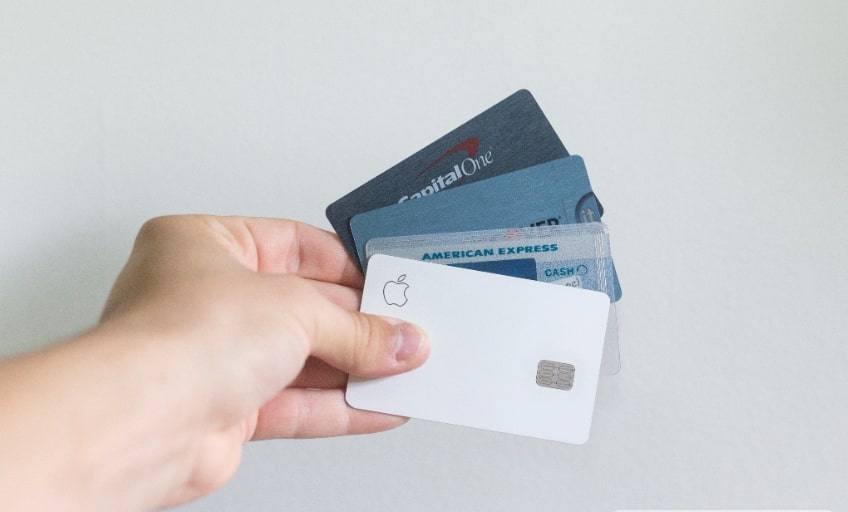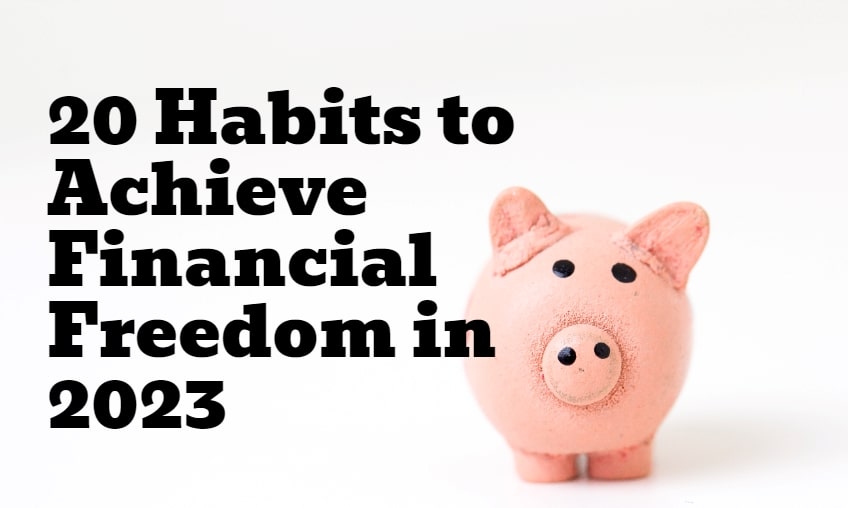Achieving financial freedom is a universal aspiration, yet it remains an elusive goal for many. This guide is designed to help you cultivate habits that can lead to long-term financial security and independence. By focusing on practical strategies and maintaining discipline, you can bring a sense of control and predictability to your personal finance. Let’s delve into these 20 habits and set a path to achieve the financial freedom you deserve in 2023.
This guide emphasizes on the importance of understanding your financial situation, managing your debts, changing your perspective about money, setting life goals for financial stability, and more. Each section provides actionable tips and strategies to help you move closer to financial freedom. The journey to financial independence begins with a single step, let’s take that first step together.
1. Evaluate Your Current Financial Situation
The journey towards financial freedom begins with a comprehensive evaluation of your current financial situation. This includes an in-depth analysis of your income and expenses, assets and liabilities, and your long-term financial goals. It is crucial to have a clear understanding of where you stand financially to take the necessary steps towards financial security.
Start by tracking your monthly income, expenses, and savings. A simple budgeting tool or a personal finance app can help you monitor your cash flow and identify any unnecessary expenses. Having a clear picture of your financial health will provide a solid foundation for making informed decisions and setting realistic financial goals.
2. Understand Your Debt

An integral part of achieving financial freedom is understanding your debt. This involves taking a thorough inventory of all your debts, including credit cards, student loans, mortgages, and any money borrowed from family members. It’s essential to understand the terms of each debt, such as interest rates and monthly payments, to prioritize repayment effectively.
Once you have a clear understanding of your total debt, you can create a strategic debt repayment plan. This may involve paying off the debt with the highest interest rate first or consolidating your debts to simplify payments. Regardless of the approach you choose, consistently paying down your debt is a critical step towards financial freedom.
3. Start Looking at Money Positively
Our emotional relationship with money significantly influences our financial decisions. Therefore, it’s crucial to cultivate a positive perspective towards money as you strive to achieve financial freedom. Instead of viewing money as a source of stress or a measure of self-worth, consider it a tool that can provide you with the freedom and opportunities to live the life you desire.
Starting to look at money positively requires a change in mindset. This may involve recognizing and challenging negative money beliefs, focusing on financial goals instead of financial fears, and celebrating financial wins, no matter how small. Remember, a positive money mindset can empower you to take control of your finances and move closer to financial freedom.
4. Set Life Goals for Financial Stability
Setting life goals for financial stability is a fundamental habit for achieving financial freedom. These goals provide direction for your financial decisions and motivate you to stay committed to your financial plan. Your goals might include saving for retirement, paying off high-interest debt, building an emergency fund, or purchasing a home.
To set effective financial goals, start by defining what financial stability means to you. Then, break down your long-term financial goals into smaller, manageable steps. For example, if your goal is to pay off your student loan in five years, figure out how much you need to pay each month to reach that goal. Regularly review and adjust your goals to reflect changes in your financial situation and priorities. Remember, the key to achieving financial stability is not just setting goals, but also committing to them.
5. Create a Practical Monthly Budget
The process of achieving financial freedom in 2023 begins with a comprehensive understanding of your monthly household income and expenditure. Creating a practical monthly budget is an integral step that facilitates strategic financial planning. This budget will serve as a roadmap to ensure that your bills are paid, and savings are accounted for regularly.
Observe and analyze your spending habits to discern where your money is going. Recognize areas where you can cut down expenses and redirect those funds towards savings or debt payments. Adhering to your monthly budget will help you stay focused on your financial goals and resist the urge to splurge on non-essentials.
6. Ensure Full Payment of Credit Cards
Another crucial habit for achieving financial freedom is ensuring the full payment of your credit cards every month. This practice can prevent the accumulation of high-interest consumer loans, which can significantly impede your financial progress. Timely repayment of your credit card bills not only saves you from paying heavy interest but also boosts your credit score.
While it’s important to clear off high-interest debts, don’t neglect other obligations like student loans, mortgages, or personal loans. Even though their interest rates might be lower, timely repayment of these debts is crucial for maintaining a good credit standing.
7. Initiate Automatic Savings
Automatic savings is a habit that can put you on a fast track to financial freedom. One way to implement this is by enrolling in your employer’s retirement plan and optimizing the matching contribution benefit. This is essentially free money that can grow over time and provide a solid financial foundation for your retirement years.
Another wise step would be to set up an automatic withdrawal into an emergency fund. Coupled with contributions to a tax-advantaged retirement account, these automatic savings ensure that a portion of your income is saved before you even get a chance to spend it. Remember, the recommended amount to save depends on your individual circumstances, so choose a plan that suits your needs best.
8. Begin Investing at the Earliest
The sooner you start investing, the more time your money gets to grow. Despite the volatility of the market, historical data suggests that investing early can significantly increase your wealth over time. The power of compound interest allows your investments to grow exponentially, contributing substantially to your financial freedom.
However, investing requires careful planning and knowledge. For beginners, it’s essential to start small, learn from mistakes, and gradually increase the investment amount. Remember, the goal is to grow your money, not to get rich quickly. So, make informed decisions and stay patient.
9. Keep a Close Eye on Your Credit Score

Keeping a close watch on your credit score is a habit that can directly impact your financial freedom. Your credit score determines the rate you are offered for loans, credit cards, and other financial services. It also affects your life insurance premiums and auto insurance rates. Therefore, maintaining a good credit score can save you a significant amount of money in the long run.
Monitor your financial habits regularly and make necessary adjustments to avoid any negative impact on your credit score. Use a reliable monitoring service to get regular updates about your credit status. Ensure that your credit report doesn’t contain any inaccurate information that could tarnish your credit reputation.
10. Stay Informed and Educated on Financial Freedom
Financial freedom is not achieved overnight. It is a process that requires consistent learning and understanding of different financial concepts. One of these is tax law, which can greatly impact your financial security. By staying informed about changes in tax law, you can ensure that your adjustments and deductions are maximized, thus saving you a significant amount of money.
Continuing education on financial freedom also involves regular reviews and adjustments to your investment portfolio. Understanding the dynamics of different investment options and how they impact your financial goals is essential. This will not only increase your income but also diversify your sources, ensuring long-term financial security.
11. Regular Maintenance of Property
Maintaining your property is a practical habit that can save you a significant amount of money in the long run. From lawnmowers to shoes, taking care of your belongings will extend their lifespan and delay the need for replacement. This can significantly reduce your expenses, allowing you to allocate more funds towards your financial goals.
Property maintenance is not just about care and repair. It’s also about regular upkeep to maintain its value. This is particularly important for high-value assets like houses and vehicles. Regular maintenance not only prevents costly repairs but also helps in preserving the value of these assets, contributing to your overall net worth.
12. Practice Living Below Your Means
To achieve financial freedom, one must learn the art of living below their means. This does not imply that you must lead a life of deprivation. Instead, it’s about understanding your needs versus your wants and making conscious decisions to spend less than you earn. This practice allows you to save more and gives you the opportunity to invest and grow your wealth.
Living below your means can also help you avoid unnecessary debt. By spending less and saving more, you can build a solid financial foundation that will ensure financial security in the long run. This habit is not only beneficial for your financial health but also promotes a simple and stress-free lifestyle.
13. The Crucial Role of Emergency Funds
Life is uncertain, and financial emergencies can arise at any time. This is where the role of an emergency fund comes into play. Having money set aside for rainy days not only provides a safety net during hard times but also gives you peace of mind knowing that you are prepared for unexpected expenses.
An emergency fund ensures that you can meet your financial obligations without resorting to debt. It is a cushion that protects your financial security and allows you to maintain your lifestyle even in challenging times. Therefore, building and maintaining an emergency fund should be a priority in your journey towards financial freedom.
14. The Need for Retirement Savings

Planning for retirement is an essential aspect of financial freedom. By starting early and investing in various retirement funds, you can ensure a comfortable and carefree life in your later years. One practical way of doing this is by setting up automatic deductions from your debit card to your retirement savings account.
Retirement savings is not just about having enough money to live on. It’s also about having the financial freedom to enjoy your golden years without worrying about money. Therefore, make retirement savings a priority and start as early as possible to take advantage of the power of compounding.
15. The Value of Other Savings
Aside from retirement funds, it’s crucial to consider other savings as part of your financial freedom strategy. These may include emergency funds, high-yield savings accounts, and other investment vehicles. These savings not only provide a safety net for unexpected expenses but also serve as a source of investment capital. Starting early and investing in multiple policies can offer financial comfort and security in later life.
Furthermore, these savings can also contribute to achieving your financial goals faster. Whether it’s saving for a new car, a dream vacation, or your child’s college education, these funds can make these goals a reality. In essence, the value of other savings extends beyond just being a reserve; they are integral to achieving financial freedom.
16. Prioritizing Debt Payments
Debt payment is a significant aspect of achieving financial freedom. It’s vital to create a debt payment strategy that works for you. This involves listing all your debts and prioritizing paying those with higher interest rates first. By doing so, you can avoid accumulating unnecessary interest charges and minimize your overall debt.
Once the high-interest debts are taken care of, you can then shift your focus to smaller debts. This approach not only helps in maintaining a balance in your finances but also provides a clear roadmap towards becoming debt-free. Remember, every step taken towards debt payment is a step closer to financial freedom.
17. Negotiating with Creditors
Negotiation is a versatile skill that can substantially aid your journey towards financial freedom. If you’re struggling with debt payments, consider reaching out to your creditors. Explain your financial situation and negotiate for favorable terms such as a lower interest rate or an extended repayment period.
Most creditors are willing to work out a solution as long as it ensures they get their money back. So, don’t hesitate to negotiate. Remember, every penny saved through negotiation is a penny earned towards your financial freedom.
18. Considering Debt Consolidation
Debt consolidation can be a useful tool in managing multiple debts, especially high-interest ones like credit card debt or student loans. It involves combining all your debts into one, ideally with a lower interest rate. This way, you only have a single payment to worry about each month, which can significantly reduce the mental burden and make your debt more manageable.
For instance, if you have a $300 minimum payment on your credit card debt and your student loans respectively, consolidating these into one payment can be a significant weight off your shoulders. However, remember to choose the method that best suits your financial situation, be it the snowball method or paying off the debt with the highest interest rate.
19. Making Use of Loan Refinancing
Refinancing your existing loans can be another effective strategy towards achieving financial freedom. It allows you to revise the terms of your loan, potentially lowering your interest rates, extending the repayment period, or reducing the monthly payment amount. This can result in significant savings over time and help you free up funds for other financial goals.
However, it’s essential to carefully evaluate the benefits and costs of refinancing. While it can save you money in the short term, it might increase the total amount you pay over the life of the loan if the repayment period is extended. Therefore, make sure to do your due diligence before making a decision.
20. The Power of Consistency, Discipline, and Accountability
Embarking on the journey to financial freedom requires an unwavering commitment to consistency, discipline, and accountability. The road may be winding, but the rewards are immense. Whether it’s saving money, investing wisely, or learning about financial freedom, the key is to remain consistent in your efforts. This is not a one-time task, but a continuous process that demands your persistent attention.
Discipline is being mindful of your spending, making financially responsible decisions, and sticking to your budget, no matter the temptations. Accountability, on the other hand, is about taking ownership of your financial decisions, learning from your mistakes, and making necessary adjustments. Together, these three tenets set the foundation for successful financial management and ultimately lead to financial freedom.
Wrapping Up: Your Path to Financial Freedom
As we conclude, remember that reaching financial freedom is an individual journey. However, following these 12 steps can serve as a roadmap to help you navigate financial issues and pave your path to financial freedom. It includes setting up direct debits after payday, transferring your salary into a separate account for expenses, and constantly looking for better deals to save money.
Financial security is not just about making money but also about taking advantage of every opportunity to save and grow your wealth. Approach your financial journey with a proactive mindset, look for ways to increase your income, and prioritize responsible behavior. With consistency, discipline, and accountability, you will find that financial freedom is a realistic and achievable goal. Good luck on your journey!
